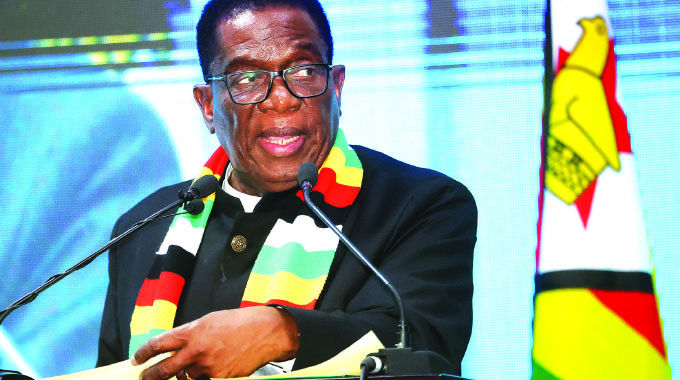Business Reporter
THE Ministry of Tourism and Hospitality Industry is set to revive the US$500 Million Tourism Recovery Guarantee Facility and the US$100 Million Tourism Revolving Fund, following recent discussions with relevant authorities.
As one of Zimbabwe’s fastest-growing sectors, tourism is poised to play a pivotal role in the country’s economic recovery scheme.
The industry has already surpassed its US$5 billion revenue target, initially projected for 2025, further establishing Zimbabwe as a preferred global tourism destination.
The initiative comes in the wake of President Mnangagwa’s launch of a tourism growth plan in August 2020, aimed at revitalising the sector after it was severely impacted by the Covid-19 pandemic.
 President Mnangagwa
President MnangagwaThe National Tourism Recovery and Growth Strategy is anchored on Zimbabwe’s vision to be a prime international tourist destination based on the judicious and sustainable exploitation of the unique assets of nature, culture, heritage and the built environment as espoused in National Development Strategy 1 (NDS1).
The strategy is informed by the Government’s Vision 2030 to become an upper-middle-income economy characterised by increased investment, decent jobs and a populace free from poverty, hunger and corruption
The Government in 2020 came up with a $500 million Tourism Support Fund in guarantees for the tourism sector players to access working capital in the form of loans from banks.
An initial US$20 million was injected into the Fund as seed capital while Value Added Tax (VAT) payable by tourists for accommodation and visitor services was waived to allow breathing space.
Authorities said the fund had significant progress in the implementation of the National Tourism Recovery and Growth Strategy, which seeks to grow the tourism economy to US$5 billion by 2025.
Speaking during a recent pre-budget seminar held in Bulawayo, the Permanent Secretary of the Ministry of Tourism and Hospitality Industry, Dr Takaruza Munyanyiwa, announced that discussions have commenced with the Ministry of Finance, Economic Development, and Investment Promotion.
“The ministry has since started engagement with the Ministry of Finance to discuss modalities on resuscitation of the Funds with the aim of providing affordable and accessible loans that cater for the needs for both SMEs and large players in the industry.
“A comprehensive assessment will be undertaken by the sector to identify gaps and critical need areas to enhance equitable distribution of the funds to sector players,” Dr Munyanyiwa said.
He noted that a deliberate tourism blue-print to be more aligned with the promotion of domestic tourism is critical.
“The ministry acknowledges the need to drive domestic tourism as a key tourism driver and in developing a resilient sector capable of withstanding global shocks. The ministry will develop the suggested blue print to guide sector on domestic tourism promotion,” he said.
The recommendations put forth emphasise the necessity of reassessing the quantity and levels of taxes, levies, and fees that render the tourism and hospitality sector less competitive when compared to regional tourist destinations.
Analysts say too many taxes levied on the sector players weigh heavily on the local tourism industry as they translate to higher prices compared to the regional average.
Some of the taxes include the tourism business licence fee, national park fee, wildlife fee, Ministry of Transport fee, travel agent permit fee, external tour operators’ permit fee, car hire permit fee, and houseboat permit fee.
Operators are also obliged to remit performance rights fees in terms of the Copyright Act to the Zimbabwe Music Rights Association (Zimura) and pay television licence fees for every set in a hotel room.
Furthermore, acts including the Tourism Policy Act, Liquor Act, and Environmental Management Act require operator payment.
“The ministry has noted with concern the issue of deterring fees and multiple licensing of the sector and will engage various stakeholders to facilitate ease of doing business in the sector and promote investment in the sector
“The Ministry of Tourism and Hospitality Industry needs to leverage on the promotion of domestic tourism as a resource mobilisation strategy through the promotion of such initiatives as Zero rate Value Added Tax (VAT) on domestic tourism particularly on accommodation and services as well as review the taxes downwards applicable to domestic flights’ tickets where 60 percent of costs are taxes,” said Dr Munyanyiwa.
The ministry announced its commitment to ongoing engagement with key stakeholders and facilitators in order to develop flexible and valuable packages tailored for domestic tourists.
This initiative aims to encourage local patronage of products, particularly among low-income earners.
Domestic tourism contributes to the travel economy and contributes to overall economic growth, especially during global crises and periods of low international tourist arrivals into the country.
Domestic tourism sustained the industry after the outbreak of the Covid-19 pandemic, which prevented foreign travelling due to national lockdowns by countries globally to contain the spread of the respiratory disease.
It can also help restart tourism in specific regions or destinations, while it can also reduce income inequality by raising incomes for people in rural and remote areas.
This post was originally published on here







